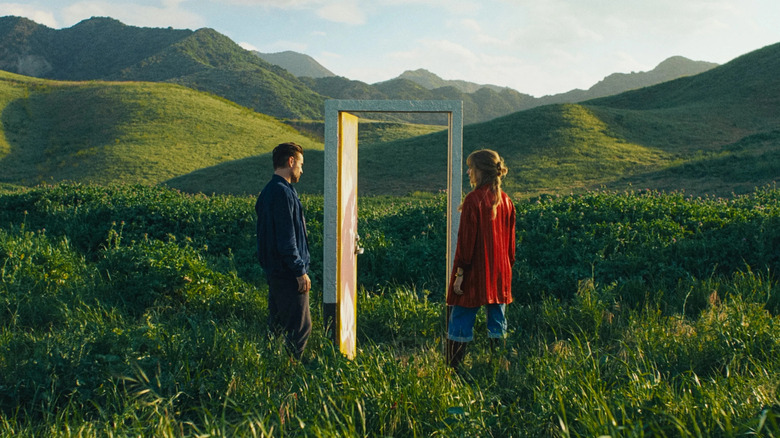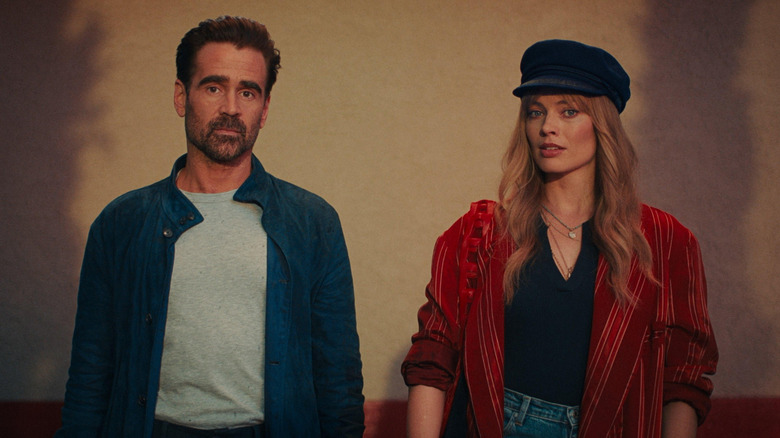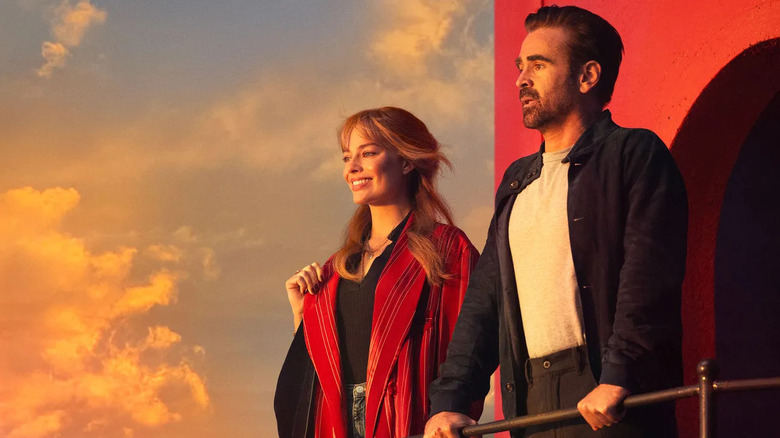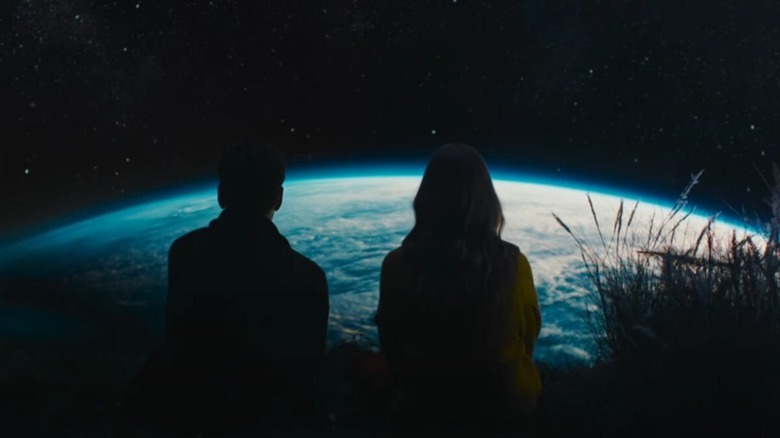A Big Bold Beautiful Journey Review: A High-Concept Romantic Fantasy With No Passion
So, do you remember that one-act play you wrote in your sophomore year in college? You remember the one. It was a work of magical realism, and it dealt with really heady, mature, adult themes. It had a lot of cussing in it, but also incorporated a musical number from your favorite stage show in high school. Although the main characters were humans, there was a whimsical scene wherein a minor trickster god took control of the action. You were convinced it was following ancient literary traditions handed down from Gilgamesh, but it also had explicit pop culture references. And it all climaxed with two adults confessing that they may not be ready for love yet.
Yeah, you remember it. You probably also remember squirreling it away after graduation, hoping none of your friends and family ever read it. Because after graduation, you came to realize that script was horrendously immature, romantically naive, and not nearly as funny as you had initially assumed. You understood that it was mawkish, and based only on your jejune, youthful assumptions about adult romance. Once you accumulated some actual romantic experience, and came to read more drama, you saw your work as mere juvenilia. It felt profound at age 19, but very shallow at 22.
That script you wrote is now somehow a major motion picture from Columbia Pictures, starring Colin Farrell and Margot Robbie, and directed by Kogonada ("After Yang," "Columbus"). It's called "A Big Bold Beautiful Journey," and it's as high-concept as they come. Two insanely attractive actors are thrust into a magical world where they can pass through enchanted doors that inexplicably transport them through time, allowing them to face their past selves or speak to deceased parents. All the while, they speak prolonged platitudes about disenchantment, romantic misunderstandings, and the possibility of giving love another chance. And they stop to sing multiple numbers from "How to Succeed in Business Without Really Trying."
It's not a terrible film, but it's not mature enough to understand the machinations of the human heart.
A Big Bold Beautiful Journey is full of melodramatic musical swells and teary confessions
As noted, the premise is incredibly high-concept, and might have been better suited in the hands of a more whimsical director. Say Jean-Pierre Jeunet or Michel Gondry. Kogonada, best known for deeply felt, understated, somewhat intellectual dramas, goes full teen soap opera with "Big Bold," layering in some of his trademark ambience, but mostly pushing into melodramatic musical swells and teary confessions.
Colin Farrell plays David, a man who rents a car to attend a wedding a few hundred miles away. The car rental office, however, is run by two very strange rental agents, played by Phoebe Waller-Bridge and Kevin Kline. The audience can see right away that the agents are magical creatures, or perhaps aliens, who speak in a bizarre, inscrutable patois. They ask David cryptic questions about the nature of acting, then equip David's 1994 Saturn with a high-tech/magical GPS that looks like a cross between HAL 9000 and one of those 1980s Game & Watch LCD devices. This GPS will serve as God in this universe.
At the wedding, David meets Sarah (Robbie), a bitter young woman who is through with romance. The two flirt a lot — they are both distractingly good-looking — but Sarah insists that she'd be a bad girlfriend, as she has a habit of breaking her lovers' hearts. It seems awfully presumptuous that David was already in love with her. Exiting the wedding, David is asked by his sentient GPS if he wants to go on a big, bold beautiful journey, and he agrees. The GPS leads him to Sarah, who also has a magical widget in her rental car, and who likewise agrees to go on a big, bold, etc.
The GPS leads them to a disembodied (disembuildinged?) door out in the woods. They pass through, and lo, they are in a lighthouse in Canada, a place where David once visited. It gets more treacly from there.
A Big Bold Beautiful Journey feels weirdly distant
The enchanted GPS's door allows David and Sarah to visit their own pasts and interrogate their romantic evolution. David gets to visit his high school and confront the would-be teenage girlfriend that once broke his heart. And backstage during a "How to Succeed" performance, no less. Sarah visits a museum that she used to visit with her mom (Lily Rabe), before actually going to the hospital where her mother died years earlier. They both get to re-enter a local diner (they live in the same town) where they both, by coincidence, cruelly dumped their exes. In the film's stronger sequences, they both get to have conversations with their younger parents.
Don't worry about causality or other such sci-fi concepts. These are all magical, psychic dimensions designed to serve as supernatural therapy for two adults who, at the end of the day, haven't really suffered wicked fates in the least.
For all of "Big Bold's" highfalutin language about romantic development, the exhilaration of love, and the importance of mere contentment, none of it leaps off the screen. Despite the swelling music, indie rock soundtrack, and dazzling photography (by Benjamin Loeb), "Big Bold" feels weirdly distant. Robbie and Farrell are both excellent actors, but they're saddled with characters who cannot feel so much as posit and query their own emotional states like aliens with scalpels. The film's conversations about love feel academic, theoretical, and inconclusive. There is no fire, no heat, no passion. This is a romance of the brain. "Big Bold" knows the emotional vocabulary of a jilted teen, but not the fiery inner romantic furnace of a passionate, sexual adult. To paraphrase Raquel S. Benedict, everyone is big bold and beautiful, and no one is horny.
A disappointment from Kogonada
"A Big Bold Beautiful Journey" could have stood a little bit of actual human sloppiness. The Margot Robbie character keeps on declaring that she is an emotional mess, and she does admit to having made some pretty horrendous decisions in her life (one of her youthful affairs was notably ill-advised), but the actual tears, outrage, and exhilaration from those decisions all happen off-screen. They are mentioned and not felt, told and not shown. "Big Bold" isn't a messy, wounded dissection of the human heart as it declares, but a near-antiseptic romantic navel-gaze. Is the quickest way to a man's heart through his navel?
Also, when one begins to ponder the mechanics of the film's magical conceits, one will begin to question the trickster gods' motives. This is more or less a film about God (or perhaps extraterrestrials) intervening in two people's lives, giving them a magical form of light therapy. Confoundingly, Sarah and David just sort of go along with everything they encounter, more scared with confronting old lovers than the fact that Q from "Star Trek" has made them his playthings. Perhaps they are mere cupids who understand that you can no longer shoot arrows of love into people's hearts. These are Millennial cupids, carefully offering pop psychology and fantastical Y.A.-fiction-ready portals as a means to repair the psyche. Only then can we get to the amor.
"Big Bold" is a disappointment from Kogonada, whose walk-and-talk film "Columbus" felt natural and honest, a real conversation between kindred spirits, bonding over their mutual love of architecture. His "After Yang," a sci-fi film about a live-in android, dealt with the nature of memory, and inter-class attitudes about "the help." They were well-thought-out, mature, and sophisticated. "Big Bold," in contrast, may appeal to junior high schoolers, and no one beyond. It's not that big, it's hardly bold, and it's only beautiful on its surface. It could have been a journey.
/Film Rating 4.5 out of 10
"A Big Bold Beautiful Journey" opens in theaters on September 19, 2025.



